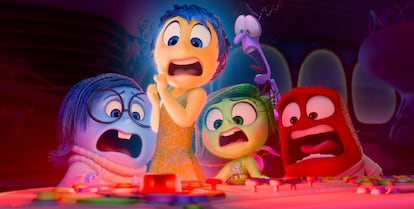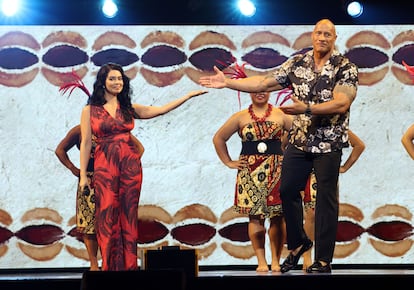After the summer success of ‘Inside Out 2,’ the animation industry faces an uncertain future
Pixar’s film is the highest-grossing animated movie in history, but the rise of artificial intelligence, offshoring and layoffs have cast a shadow over the sector


The numbers speak for themselves. Inside Out 2 is the highest-grossing animated film in history (not taking inflation into account). What’s more, with more than $1.63 billion in box office sales, it is so far the 10th highest-grossing movie overall. It is the highest-grossing film in the history of Brazil, Mexico, Colombia, Chile and Uruguay. Its success has been overwhelming, but does not in any way take away from the other triumph of animation: Despicable Me 4, which made $850 million, and is the third most watched film of the year, enshrining the minions as one of the great cinematic icons of the 21st century. Both movies succeeded in a family-friendly summer. And yet, the future of this very important space in the cinema is cause for some anxiety.
So far, the response has been euphoria. It is the feeling that best describes the success of animated movies in a summer where Kung Fu Panda 4 and the new Garfield movie also performed well at the box office. But uncertainty is looming on the horizon. Last November, Jeffrey Katzenberg — the co-founder of DreamWorks, who was the president of Disney in the 1990s — warned artificial intelligence will eliminate 90% of artistic jobs in animation within three years: “In the good old days when I made an animated movie, it took 500 artists five years to make a world-class animated movie. I think it won’t take 10% of that.”
Animation is the driver of new original movies in an industry dominated by sequels and franchises. According to Nielsen streaming data, seven of the most-watched films in 2023 were animated: Moana reigned supreme (with a sequel coming out in November), followed at the top by Enchantment, Super Mario Bros and Elementary. Children and families rush to watch animated movies in cinemas or platforms, and then rewatch them again and again. It is also worth asking whether blockbuster hits such as Avatar, Planet of the Apes and the upcoming Mufasa: The Lion King — made almost entirely by computer and with similar equipment — can also be considered animated movies.
The animation industry — which has grown in terms of diversity, style, technology and geography since the 1990s — is nevertheless in a difficult situation. Not for any lack of creativity or because of the obsession with movie franchises (although that could also be debatable), but rather due to how technology is changing the workplace. After several unexpected failures, Pixar laid off 14% of its employees in May (before the summer hit of Inside Out 2). “I don’t know of an industry that will be more impacted than any aspect of media entertainment creation,” said Katzenberg at his conference in Singapore.
Change is inevitable. Some, however, do not believe that it will be as fast and drastic as this star executive suggests. “The industry is in complete turmoil: first platforms, now artificial intelligence, and strikes in between,” Ann Le Cam, former Disney animation vice president, told EL PAÍS in May at the Animayo Gran Canaria festival. “These are turbulent times, but I am optimistic, and perhaps we can reach a more democratized industry that pushes forward new content from voices that until now were kept out.”
While Le Cam was at Disney, the studio released hits such as Frozen, Wreck-It Ralph, Zootopia and Moana: “Artificial intelligence is controversial because it is not regulated. We need a law to protect intellectual property and artists,” says Le Cam, who is now a Harvard professor. “But I think there will always be a creative task that is necessary, although in the animation process, there are many repetitive tasks that a machine could possibly do more quickly and cheaply.” In fact, in some projects, AI is already being used to help with automated or repetitive tasks, although no one wants to advertise this too loudly.
Le Cam — who believes animators must seek out what sets them apart and “turn it into a weapon” — is a firm believer in the phrase “animation is not a genre,” which Guillermo del Toro has made his motto. The Mexican filmmaker highlighted the diversity of the medium in his Oscar-winning animated film Pinocchio. Many other directors have also embraced animation: Charlie Kaufman, Wes Anderson, Richard Linklater and even David Lynch, whose animated movie was rejected by Netflix.
Amid the constant releases of superhero movies, animation has created some of the most enduring and successful original films, such as Up, Spirited Away and How to Train Your Dragon — movies that were not sequels or adaptations of famous works. Despicable Me is another example. Minions have captured the hearts of today’s generation of twenty-year-olds, and can be seen on keychains, badges, folders, phone cases, etc. All films in the saga are a hit, and a seventh movie will be released in 2027. Generation Z and Alpha — children born between 2010 and 2024 — are responsible for this success. This is the same audience that has rushed to see out Inside Out, which will have a spinoff TV show.
AI is not the only challenge facing the industry, which has seen significant relocation since 2020 due to the rise of teleworking. This shift led Skydance Animation — now run by Pixar founder John Lasseter (fired from his company due to accusations of abuse) — to open a headquarters in Madrid.
Lucía Peralta, who creates special effects, works at Skydance Animation Madrid. “I don’t believe in the apocalypse. You only have to enter our studios to see that people are still being hired,” she says about the company, which is working on the new film by Brad Bird, the director of The Incredibles. In 2025, the company plans to merge in with Paramount, Hollywood’s leading studio. In November, the studio’s movie Spellbound — featuring the voices of Nicole Kidman and Javier Bardem — will be released on Netflix.

Spanish actress Mercedes Delgado — who has worked on Ninja Turtles and What If…? — points out that teleworking “has its positive side: you save money, and many people are already working from Spain for the U.S. without any problems.” She admits, though, it also has its downsides: “You lose contact, the juniors don’t learn and it’s increasingly isolated work with less communication.”
But Delgado believes that the gloomy forecasts for the animation industry don’t understand what the work of an animator involves. “They force us to change very specific and artistic things in the same day, two or three times. That’s unfeasible with an AI without human help. Tell the machine to remove just one eyelash from a character’s eye, or a little tree or the light in the background on the right. It always fails when it comes to details, which is what the client looks at, what they ask for on a day-to-day basis.”
However, Delgado believes the rise in AI will affect workers in India or Thailand, the most exploited in the production chain. “There could be an army of juniors refining the results of AI, but it needs monitoring. It may eliminate redundant positions,” says Gustavo Sánchez-Pérez, Delgado’s husband and special effects supervisor on animated TV shows such as Avatar: The Last Airbender.
Bill Plympton, a two-time Oscar nominee and pioneer of independent production, has seen the industry change. “I’ve been making animation at home since the 1980s, and back then it was unique. Nobody made independent animated films, because you needed a lot of money and to join a studio. Now anyone can do it with a computer. And you don’t even have to go to Hollywood, you can be in the Arctic,” he said optimistically during his visit to Animayo.
He has clear advice for young animators: when they leave college, they should sign up for a studio to earn money, contacts and experience, and then use those savings to do what they like. He trusts that creativity will always be there. And perhaps that creativity will lead to a new Inside Out — not another Toy Story movie.
Sign up for our weekly newsletter to get more English-language news coverage from EL PAÍS USA Edition
Tu suscripción se está usando en otro dispositivo
¿Quieres añadir otro usuario a tu suscripción?
Si continúas leyendo en este dispositivo, no se podrá leer en el otro.
FlechaTu suscripción se está usando en otro dispositivo y solo puedes acceder a EL PAÍS desde un dispositivo a la vez.
Si quieres compartir tu cuenta, cambia tu suscripción a la modalidad Premium, así podrás añadir otro usuario. Cada uno accederá con su propia cuenta de email, lo que os permitirá personalizar vuestra experiencia en EL PAÍS.
¿Tienes una suscripción de empresa? Accede aquí para contratar más cuentas.
En el caso de no saber quién está usando tu cuenta, te recomendamos cambiar tu contraseña aquí.
Si decides continuar compartiendo tu cuenta, este mensaje se mostrará en tu dispositivo y en el de la otra persona que está usando tu cuenta de forma indefinida, afectando a tu experiencia de lectura. Puedes consultar aquí los términos y condiciones de la suscripción digital.








































